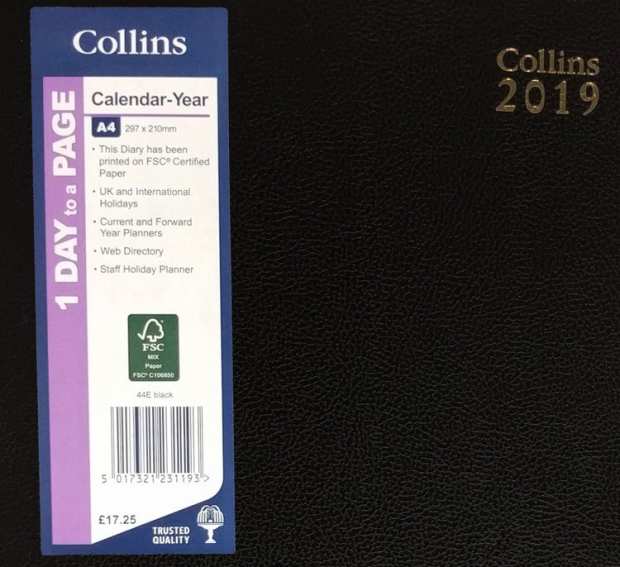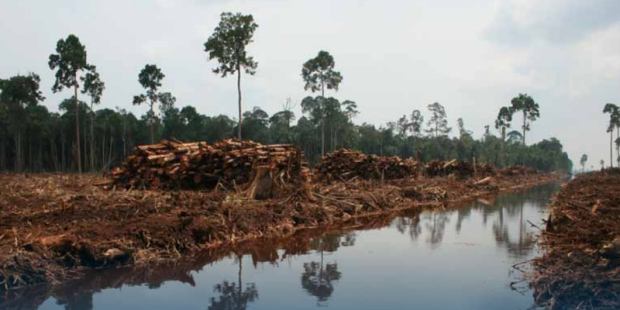“FSC controlled wood is material from acceptable sources that can be mixed with FSC-certified material in products that carry the FSC Mix label.”
That’s how FSC describes “Controlled wood” on its website. The reality is that FSC is no guarantee of legality.
In fact, “controlled wood” doesn’t even exclude products from companies that FSC has disassociated itself from.
Here’s an FSC Mix Label on a 2019 Diary, sold by Collins, the UK’s leading diary and stationery supplier:

That’s a screenshot, taken today, from Amazon.co.uk.
Just above the FSC Mix label is this statement: “This Diary has been printed on FSC® Certified Paper.” This is a misleading statement. It gives the impression that the diary is printed only on paper that is FSC certified. In fact, since the label is FSC Mix, individual diaries may contain very little or no FSC certified paper.
Every time an FSC Mix label appears on a product it confuses the public. But this particular FSC Mix label is much worse. The FSC Mix label on Collins diaries is on a product produced by a company from which FSC has disassociated itself.
Certifying Nippecraft
In 1995, a Singapore-based company, Nippecraft Limited, bought Collins for £10 million.
In October 2007, FSC disassociated from APP, “because of substantial, publicly available information that APP was involved in destructive forestry practices, which brought it into conflict with the FSC mission”.
On 6 July 2011, Control Union Certifications B.V. issued a chain of custody certificate to Collins Debden. On 28 September 2011, DNV GL Business Assurance Sweden AB issued a chain of custody certificate to Nippecraft.
APP and Nippecraft
FSC’s certification bodies failed to do even the most basic due diligence. The fact that APP controlled Nippecraft was publicly available information.
From July 2007 to October 2017, Linda Suryasari Wijaya Limantara was the chair of Nippecraft’s Board. Her sister, Indah Suryasari Wijaya Limantara, was a director of the company. The Wijaya family controls the Sinar Mas group, APP’s owner.
While the involvement of someone with the name Wijaya may not be conclusive proof that the company is part of the APP group, it’s a pretty good indication that a little more research might be a good thing. Linda Wijaya is a granddaughter of Eka Tjipta Widjaja, the founder of the Sinar Mas Group. She was, until recently, the Managing Director of the Asia Pulp and Paper Group, and President Commissioner of PT Indah Kiat Pulp and Paper (APP’s massive pulp mill in Sumatra).
A statement from Nippecraft’s 2010 Annual Report – the most recent available when Nippecraft was certified – leaves no doubt that Nippecraft is an APP company:
APP Printing (Holding) Pte Ltd (“APH”), a company incorporated in Singapore, holds 63.69% (2009: 63.69%) of the share capital of the Company [i.e. Nippecraft Ltd] and is deemed as its immediate holding company.
APH is a wholly-owned subsidiary of PT Andalan Prapanca Pertiwi (“PT APP”) and Asia Pulp & Paper Company Ltd (“APP”) has 89.9% shares in PT APP.
APP Golden Limited, a company incorporated with limited liability under the laws of the British Virgin Islands, currently controls approximately 63.32% (2009: 63.32%) of the voting power of APP and is considered as the ultimate holding company.
Had either Control Union or DNV taken the trouble to read Nippecraft’s Annual Report that would have been enough to stop Nippecraft receiving any sort of FSC certification.
Yet neither of FSC’s certification bodies has been suspended for issuing FSC chain of custody certification to a company that is owned by APP – a company that FSC has disassociated from.
Nippecraft and deforestation
Had anyone in either of the certification bodies bothered to google “Nippecraft” they may well have had second thoughts about the merits of the certification.
In 2012, Greenpeace put out a report titled, “The Ramin Paper Trail”. Greenpeace’s investigation found that APP’s Indah Kiat pulp mill in Sumatra regularly mixed illegal ramin logs into its supply of logs from mixed tropical hardwood (MTH). Mixed tropical hardwood is timber from Indonesia’s forests, not from industrial tree plantations.
Since 2001, logging and trade of ramin has been banned in Indonesia. Indonesian ramin is banned under the UN Convention on International Trade in Endangered Species (CITES).
Greenpeace found that APP planned to increase the supply of mixed tropical hardwood to its Indah Kiat pulp mill from 20% in 2009 to 44% in 2011.
Among the products that Greenpeace found to contain mixed tropical hardwoods, were Collins Debden diaries, bought in the UK and Australia.
Unlike FSC’s certification bodies, Greenpeace had no difficulty in establishing that Nippecraft was an APP company:
Nippecraft and its subsidiary Collins Debden are part of the APP Group and Nippecraft buys ‘finished products including stationery products’ from APP group mills. Between 2009 and June 2011, over 70% of Nippecraft purchases from within the APP group were from PT Pabrik Kertas Tjiwi Kimia, including TK Import & Export Ltd. In 2010, the value of this direct trade with Tjiwi Kimia represented $18 million. Unlike Pindo Deli and Indah Kiat, Tjiwi Kimia includes a printing house, TK Printing, and thus is able to supply finished products including stationery products.
In March 2018, when Greenpeace (at last) reached the decision to leave FSC, Associated Press journalist Stephen Wright reported that, “for the past decade it [i.e. FSC] continued to certify diary and notebook company Nippecraft and its Collins Debden brand, which is owned by the Sinarmas family through APP. The council is now reviewing those specific certifications.”
FSC got round to suspending Nippecraft’s certificate more than four months later, in August 2018.
FSC certificate suspended, but FSC Mix label stays on products
But even that isn’t the end of these misleading labels. FSC is allowing Nippecraft products to carry the FSC logo for another eight months after suspending the certificate.
A note on the FSC’s certificate search website states that,
FSC Certificate of the Nippecraft Ltd. will be terminated due to association with a disassociated company. Nevertheless, the TLA [trademark licence agreement] of Nippecraft Ltd. shall not terminate until 31st March 2019.

FSC’s “roadmap” for ending disassociation from APP
This whole sorry situation, as well as exposing FSC’s naivety and incompetence, also exposes Asia Pulp and Paper’s complete lack of a corporate moral compass. Since December 2012, APP has been in negotiations with FSC about the possibility of renewed association with FSC.
Throughout this entire process, one of APP’s companies was FSC certified – obviously in breach of FSC’s disassociation from APP.
FSC drew up a “Roadmap” for allowing APP back into the FSC system. It held public consultations, organised a stakeholder engagement plan, held a series of stakeholder workshops, and generally bent over backwards to get APP into the FSC system.
In February 2017, FSC’s Board of Directors approved the “Roadmap towards ending the disassociation from APP”.
In 2017, at its Annual General Meeting in Vancouver, FSC even voted to allow certification of industrial tree plantations established on forests cleared after 1994.
APP’s new pulp mill drives deforestation
While all this was going on, APP built a massive new pulp mill. The mill started operations in 2017. Predictably enough, the demand for wood from the new mill is a driver of continued deforestation.
In December 2017, Stephen Wright, reporting for Associated Press, exposed the fact that the plantation companies that supply APP with wood, which the company claimed were “independent”, were actually owned by APP or affiliated with APP.
Wright gave specific examples of how APP continued to destroy Indonesia’s forests. For example:
Evidence Sinarmas is indirectly violating its no-deforestation pledge comes from drone photos and satellite images of 13,000 hectares of forest in Borneo that a plantation company, Muara Sungai Landak, has a government permit to exploit. Government records that track levies companies pay when cutting tropical timber on such so-called concession lands also show the deforestation is taking place.
Muara Sungai Landak is owned through layers of holding companies by a 36-year-old IT employee of Sinarmas Forestry and a 43-year-old auditor at Sinarmas Forestry.
As ever, FSC’s reaction was lightning fast. Only eight months after Wright’s article, FSC put out a statement about APP:
The Forest Stewardship Council (FSC) has decided to suspend the process to design a roadmap for ending disassociation with Asia Pulp and Paper (APP).
FSC has taken this decision in order to reassess the roadmap process while it awaits further information from APP related to its corporate structure and alleged unacceptable forest management activities by companies thought to be related to APP. Dialogue with APP will continue in view of ensuring full disclosure about these issues.
APP remains disassociated from FSC, until such time as it has fulfilled the requirements set by FSC.
PHOTO Credit: Rainforest Action Network.
